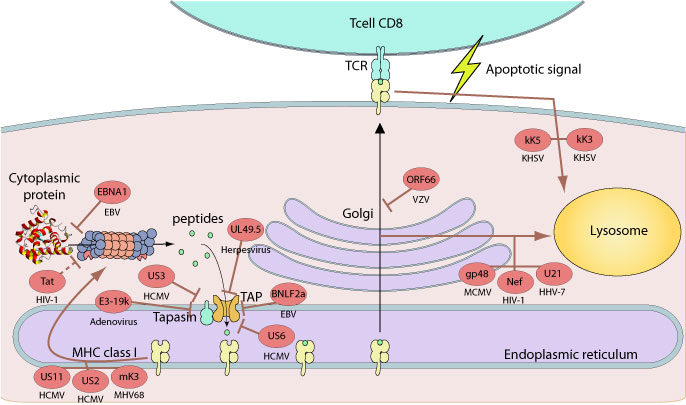Inhibition of host adaptive immune response by virus (kw:KW-1080)
Unlike innate immune response, which remain essentially unchanged upon exposure to a recurrent challenge with the same stimulus, adaptive immune cells possess the ability to learn and remember. Adaptive immunity relies on the capacity of immune cells to distinguish between the body's own cells and unwanted invaders. Healthy cells present peptides from normal cellular proteins on their cell surface, and lymphocytes will not be activated in response to them. When a cell is infected by viruses or other pathogens, the foreign peptides generated are recognized by lymphocytes that are activated and destroy the infected cell.

Viruses employ different strategies to inhibit presentation of viral-derived peptides. One way consists of the modulation of proteasome activity which generate the peptides from full-length proteins. Some viruses also directly interact with and inhibit the machinery responsible for the generation and transport of loaded MHC molecules. For instance, TAP and tapasin are common targets of viral proteins.
Matching UniProtKB/Swiss-Prot entries
(all links/actions below point to uniprot.org website)95 entries grouped by protein
1 entry
Anti-CRISPR protein 30 (Gene product 30) (gp30)
1 entry
Anti-CRISPR protein 31 (ACR3112-31) (Gene product 31) (gp31)
1 entry
G-protein coupled receptor BILF1 (GPCR BILF1)
3 entries
Protein BNLF2a
1 entry
CD2 homolog (CD2H) (5HL) (CD2v) (T-lymphocyte CD2 receptor-like protein) (CD2-like protein) (pEP402R)
7 entries
Early E3 18.5 kDa glycoprotein (E3-19K) (E3gp 19 kDa) (E19) (GP19K)
1 entry
DNA alpha-glucosyltransferase (AGT) (Alpha-GT) (EC 2.4.1.26)
5 entries
ICP47 protein (Immediate-early protein IE12) (Immediate-early-5) (Infected cell protein 47) (US12 protein) (Vmw12)
6 entries
E3 ubiquitin-protein ligase LAP (EC 2.3.2.27) (Leukemia associated protein) (LAP) (RING-type E3 ubiquitin transferase LAP)
1 entry
E3 ubiquitin-protein ligase MIR1 (EC 2.3.2.36) (MK3) (Modulator of immune recognition 1 homolog) (ORF K3) (RING-type E3 ubiquitin transferase MIR1)
45 entries
Protein Nef (3'ORF) (Negative factor) (F-protein)
7 entries
Non-structural protein 1 (Non-structural protein 1C)
1 entry
ORF7a protein (ORF7a) (Accessory protein 7a) (Protein U122) (Protein X4)
2 entries
Accessory protein p12I
3 entries
Protein OPG163
2 entries
Protein OPG173
1 entry
Serine/threonine-protein kinase US3 homolog (Protein kinase ORF66) (EC 2.7.11.1)
3 entries
Unique short US6 glycoprotein
2 entries
Membrane glycoprotein US11
1 entry
Probable protein E5
1 entry
